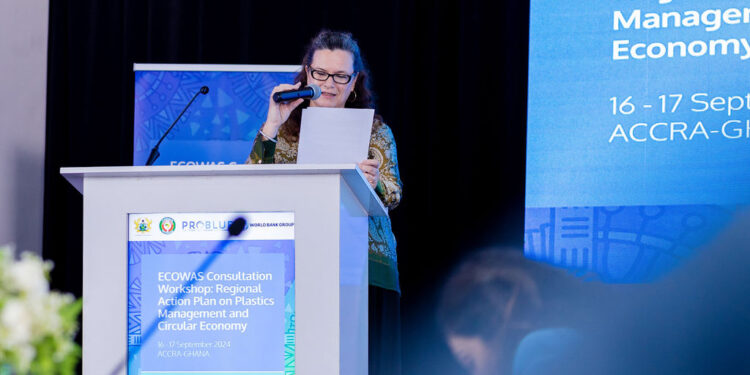World Bank Warns of Economic Impact of Plastic Pollution in West Africa, Estimates Costs Up to $33,000 Per Ton
Operations Manager at the World Bank Ghana Office, Michelle Keane, has averred that plastic pollution severely impacts West Africa’s economy, lives, and livelihoods with estimated costs ranging from $10,000 to $33,000 per ton of plastic waste.
Delivering the keynote address at the Consultation Workshop to Support West Africa Regional Action on Plastics Management and Circular Economy on Monday, September 16, Ms Keane quipped fisheries and aquaculture, marine tourism, waterfront property, biodiversity, and ecosystems are especially vulnerable to plastic pollution with the sectors facing estimated social damages of $2,000 to $7,000 per ton of plastic waste.
Adding that, the challenge of plastic pollution calls for united efforts in plastic management and the circular economy, with active public and private sector participation.

“Plastic pollution severely impacts West Africa’s economy, lives, and livelihoods with estimated costs ranging from $10,000 to $33,000 per ton of plastic waste. Fisheries and aquaculture, marine tourism, waterfront property, biodiversity, and ecosystems are especially vulnerable, facing estimated social damages of $2,000 to $7,000 per ton of plastic waste,” she remarked.
Speaking further at the Workshop, Ms Keane noted that the World Bank’s commitment to the eradication of plastic pollution is exemplified by the Bank’s support to work on plastic management and the circular economy in West Africa.
“We have supported technical assistance for policy reforms aimed at adequately taxing plastic products and holding producers accountable for the entire life cycle of their items across various countries.
“We are also championing initiatives such as establishing standards for recycled Polyethylene terephthalate (PET) in Ghana and Cote d’Ivoire, conducting recycling pilots for fishing nets in Liberia, and designing Extended Producer Responsibility schemes in Nigeria, Ghana and Sierra Leone,” she quipped.

“These initiatives promise cleaner oceans along with the potential for creating green jobs. At the grassroots level, we are focused on increasing awareness and involving citizens in waste management, empowering them to take ownership of their environment. For example, through the community-based recycling centers to be piloted under our West Africa Coastal Areas Program (WACA), and Greater Accra Resilient and Integrated Development Project (GARID) here in Ghana,” she added.
According to the World Bank, it supports harmonized regional solutions to combat plastic pollution at scale, asserting that with the upcoming global, legally binding instrument on Plastics Pollution, the Bank is dedicated to supporting ECOWAS in the development of a Regional Action Plan on Plastics Management and Circular Economy.
This, the Bretton Wood Institution noted, will ensure that West Africa is well prepared to fulfill the requirements of the upcoming Treaty, for its common rivers and oceans.

“Our support includes advocating for crucial policy reforms to create market incentives to value plastics. It also encourages significant capital investments from both the private and public sectors and promotes research and development for upstream investments such as alternative materials to plastic,” she quipped.
The World Bank is supporting ECOWAS in the development of a Regional Action Plan, in alignment with the recently launched regional Plastics Management Regulation.
The activity is part of West Africa Blue and Circular Economy PASA (P505048) and funded by PROBLUE, a multi-donor umbrella trust fund for Blue Economy. The activity builds on previous work conducted in the region on Plastics Pollution Analytical work under various ASAs, particularly on Plastics e-book published under WACA.
The World Bank Received a support request from ECOWAS in August 2023, mobilized funds accordingly, and launched the preparation of the action plan during a virtual workshop on June 24, 2024.








